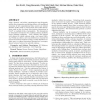1013 search results - page 109 / 203 » Comparisons Between Data Clustering Algorithms |
112
click to vote
KDD
2005
ACM
15 years 8 months ago
2005
ACM
Data clustering represents an important tool in exploratory data analysis. The lack of objective criteria render model selection as well as the identification of robust solutions...
SIGMOD
2010
ACM
15 years 2 months ago
2010
ACM
Large, dynamic, and ad-hoc organizations must frequently initiate data integration and sharing efforts with insufficient awareness of how organizational data sources are related. ...
131
Voted
HICSS
2010
IEEE
15 years 9 months ago
2010
IEEE
The disparity between data collected in rural and urban counties is often detrimental in the appropriate analysis of cancer care statistics. Low counts drastically affect the inci...
133
Voted
IROS
2006
IEEE
15 years 8 months ago
2006
IEEE
— Mobile robots operating in populated environments typically can improve their service and navigation behavior when they know where people are in their vicinity and in which dir...
ISCA
2003
IEEE
15 years 7 months ago
2003
IEEE
Clustered microarchitectures are an attractive alternative to large monolithic superscalar designs due to their potential for higher clock rates in the face of increasingly wire-d...

